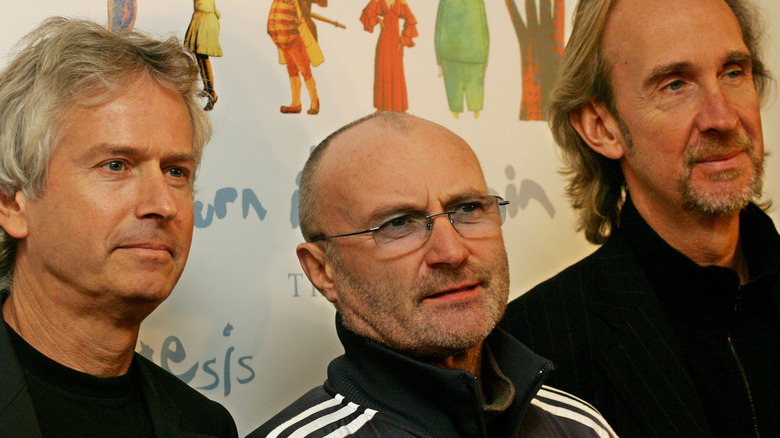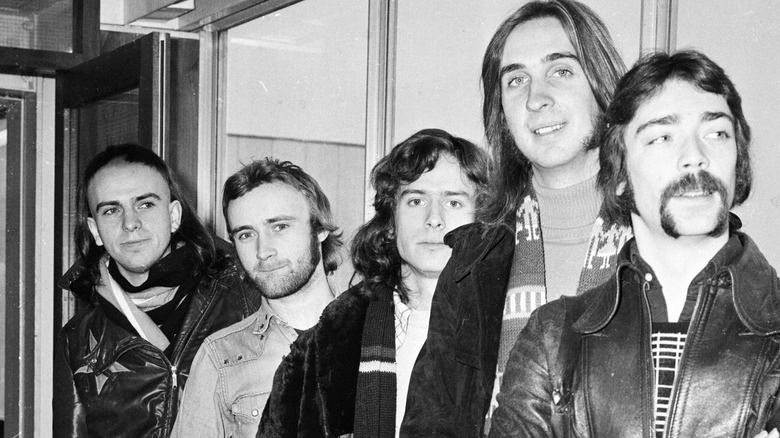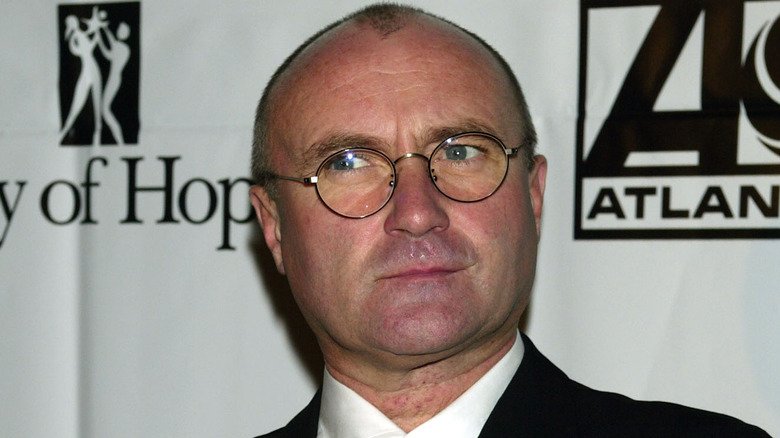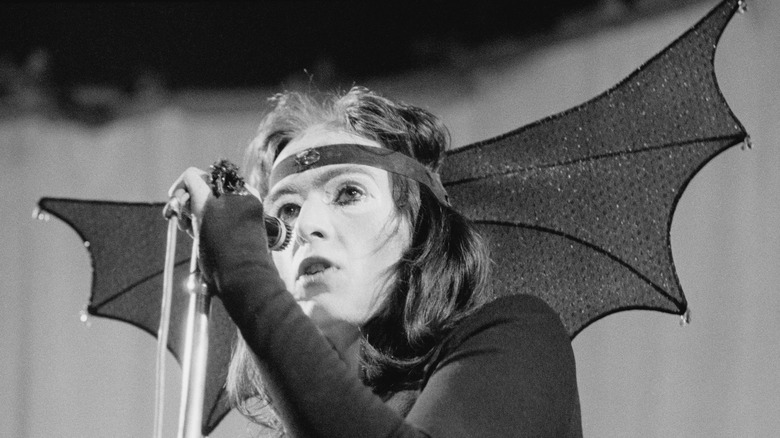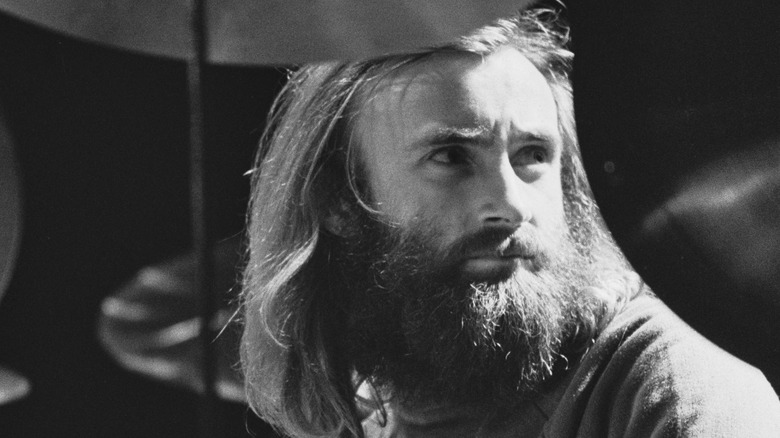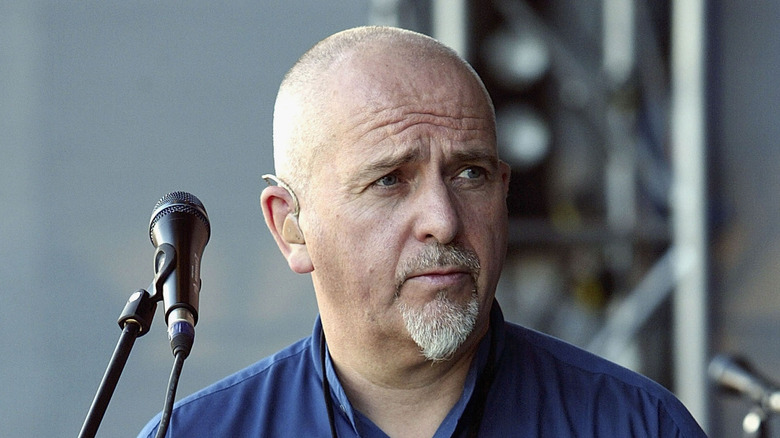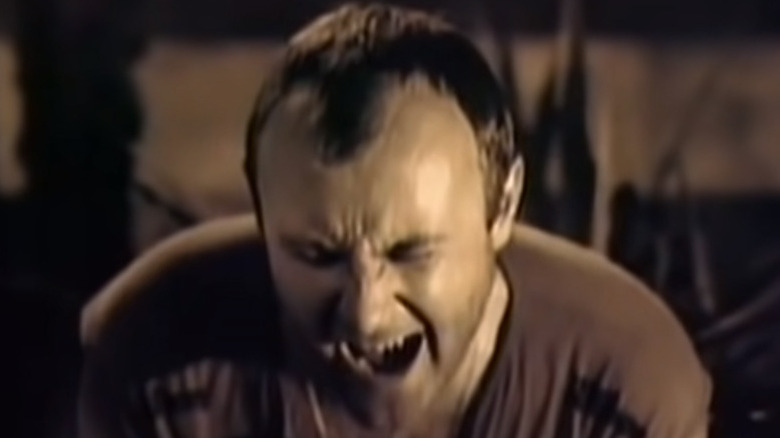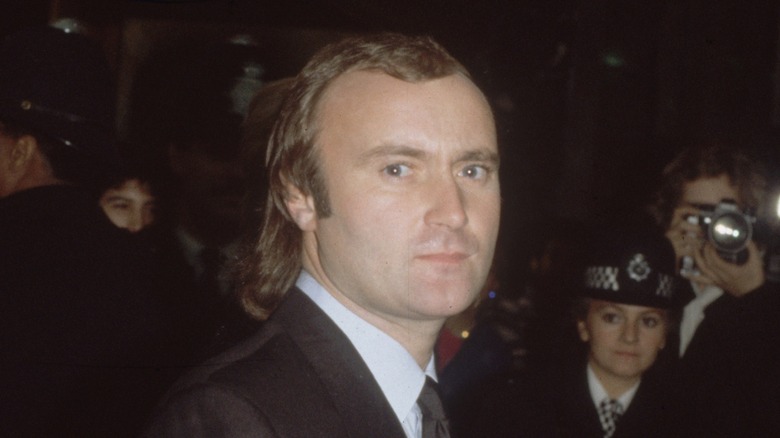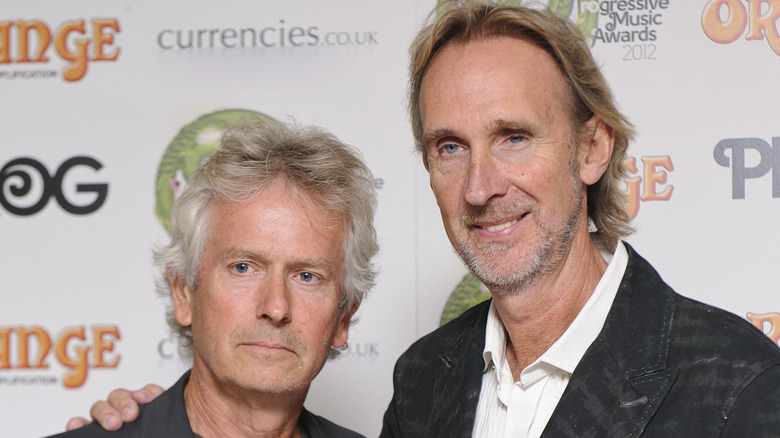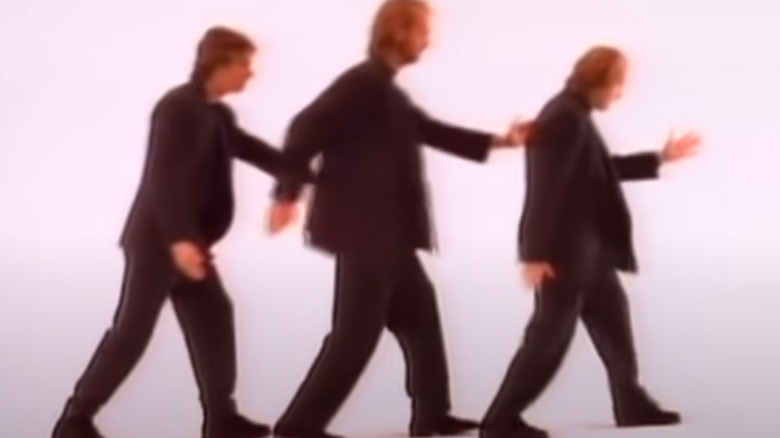The Untold Truth Of Genesis
Initially coming together in the late 1960s and recording and touring well into the 2000s, there are few bands that have lasted as long as Genesis. Even fewer bands still can claim the evolution of Genesis. The group found fame in the early 1970s as a keyboard-driven progressive rock outfit, then became a more traditional rock band, with a turn toward radio-friendly soft rock in the mid-1980s. The band is also rare in that it survived numerous personnel changes and members' solo jaunts. Drummer Phil Collins moved to lead vocal duties after the departure of artsy, costume-loving lead singer Peter Gabriel. It's hard to believe that most of the guys who recorded the quirky "The Lamb Lies Down on Broadway" are the same ones who made the slick "Invisible Touch."
In 2020, the core, latter-day members of Genesis announced that they'd play music together for the first time in years with a reunion tour that would cap a five-decade-long career that merited enshrinement in the Rock and Roll Hall of Fame. Here are some of the more fascinating and curious stops in the journey of Genesis.
Before there was Genesis, there was Gabriel's Angels
In the 1960s, Charterhouse School, a private institution in southern England, was a breeding ground for creative types, and many hopeful bands emerged. Sadly, by 1967, both of the major rock bands formed by the students there had split up. But Anthony Phillips and Mike Rutherford (formerly of Anon) kept writing together, and when recording a homemade demo, they invited the former members of Garden Wall (Tony Banks, Peter Gabriel, and Chris Stewart) to join them.
The musicians thought so highly of the demo that they wanted to re-record it professionally and contacted the only music industry contact they had: Jonathan King, a Charterhouse alum who, in 1965, had a top 20 hit with "Everyone's Gone to the Moon." He liked the tape so much that he agreed to launch the band. King landed the group a contract with Decca Records and even came up with a band name: Gabriel's Angels. "But for some reason I still can't fathom the others in the band didn't like it as much," Gabriel quipped in "Genesis: Chapter and Verse." So, King told the BBC, "I gave them the name Genesis because, for me, that was the start of my production career."
Gabriel says, "When Genesis was suggested I think we thought, 'Well, if this guy's going to pay for us to go into a studio, we'd better just go along with it." With Champagne Meadow the only other viable name in the mix, Genesis stuck.
Phil Collins was Genesis' fourth drummer
The most famous member of Genesis was not an original member of the group. After initial drummer Chris Stewart left in 1968 to go back to school, another Charterhouse alum named John Silver replaced him and played on Genesis's first record, "From Genesis to Revelation." Then he left, and ceded the gig to John Mayhew. In 1970, after the recording of the band's second album, "Trespass," guitarist Anthony Phillips left the band. Looking to restart the band in the wake of this blow, Genesis parted ways with Mayhew because he wasn't a good fit and placed ads seeking a new drummer in "Melody Maker."
Phil Collins, an actor-turned-drummer saw the ad, and arranged for an audition. "It was at Peter Gabriel's parents' farm," Collins told "Ultimate Classic Rock Nights" (via Ultimate Classic Rock). "It was a beautiful day; they were auditioning out on the patio." Collins had arrived very early, and Gabriel suggested the drummer take a dip in his parents' swimming pool while the other candidates auditioned not very far away. "I could hear anything that was going down. I knew the tunes before I actually auditioned. So when I came up to play, of course I walked straight into it. I knew all the things, so I got the job!"
Peter Gabriel wore a lot of wild costumes
Genesis came of age in the 1970s. In addition to a golden era of progressive rock, it was also the heyday of glam rock, when male rock stars like David Bowie, Marc Bolan, and the New York Dolls challenged social norms and traditional gender roles by wearing makeup and feminine-style clothing.
Peter Gabriel of Genesis wasn't a glam rocker, but he definitely took the idea of what a rock frontman can sartorially get away with to the next level. During concerts, he'd don different, specially-made costumes to better embody different characters suggested by the band's freewheeling songs. For example, portraying "The Watcher of the Skies" involved a batwing head-dress; "The Colony of the Slipperman" required a Slipperman costume that could best be described as a demonic Mr. Bubble.
For the band's 1972 album "Foxtrot," he dressed up like the red-dress-clad humanoid fox from the cover. "My wife, Jill, had a red Ossie Clark dress which I could just about get into, and we had a fox head made," Gabriel told "Uncut" (via Real World). Even Genesis fans were at least slightly unnerved by the ensemble. "The first time we tried it was in a former boxing ring in Dublin, and there was just a shocked silence. You could feel the horror. I thought, 'Oh, this is exciting!'"
How Phil Collins wound up the lead singer of Genesis
Probably in large part due to his memorable and dazzling stage persona, Peter Gabriel wasn't just the lead singer of Genesis, he was the face of the band, and in the public eye, the man and the band were almost inexorably linked. So, when Gabriel abruptly left Genesis in 1975, the exit seemed catastrophic to the future of the band. "For a time, I thought we'd carry on as a four-piece without any singing," drummer Phil Collins told Prog magazine.
Ultimately rejecting that notion, a hunt for a new singer began in earnest. Genesis put out word and received hundreds of inquiries and audition tapes. Among those who wanted the job: Manfred Mann singer Mick Rogers, future New Wave star Nick Lowe, and a guy named Mick Strickland, who landed an in-person, in-studio audition with the extant Genesis.
Nobody, apparently, was up to the task ... and then the band realized that its drummer, who'd taken lead vocals on the occasional album cut, actually had a pretty good voice. "We couldn't find another singer and so the rest of the band convinced me to do it," Collins told iNews. "There really wasn't another option and I drew the short straw."
Phil Collins almost left Genesis to join The Who
Despite his successes as a band leader and, later on, a solo superstar, Phil Collins is first and foremost a drummer. And in 1978, he almost made a decision that would have changed the trajectories of two major rock bands of the era, if not his yet-to-come solo career.
After losing Peter Gabriel in 1975, and guitarist Steve Hackett in 1977, Genesis nearly lost Collins, by that point the band's drummer and singer, in 1978. "I was working with Townshend just after Moon died," Collins told Classic Rock, referring to The Who's guitarist Pete Townshend and drummer Keith Moon, who passed away in 1978 after overdosing on alcohol withdrawal medication. "And I said to him, 'Have you got anybody to play the drums? Because I'd love to do it. I'll leave Genesis." Townshend replied, with palpable regret, as Collins recalled, that they'd just hired a new drummer: Kenney Jones, already in The Who's inner circle as he subbed in when Moon had been too inebriated to play. "But I would have done the job," Collins said. "I would have joined them."
The 1982 Genesis reunion was a matter of life and death
Peter Gabriel departed Genesis in 1975, but he stayed on good terms with his old bandmates; Phil Collins even played drums on Gabriel's third solo album in 1980. But only once did Gabriel ever front a live lineup of Genesis after his momentous exit from the group, and it was born out of a possibly lifesaving gesture of goodwill.
In 1982, Peter Gabriel launched the WOMAD Festival, or World of Music, Arts, and Dance, a live celebration and exposure platform with musical arts from around the world. It's now a 30-year-plus endeavor, but it almost immediately died off. "We thought everyone else was going to be as excited as we were. It became a nightmare experience when we realized there was no way we were getting the tickets to cover our costs," Gabriel told The Guardian. "The debts were way above what I could manage but people saw me as the only fat cat worth squeezing so I got a lot of nasty phone calls and a death threat."
Gabriel considered playing some shows to work off the debt, but he wasn't yet a huge concert draw. But Genesis, with back-to-back hit albums "Duke" and "Abacab" was. And so, the band added an extra stop to its tour, at the National Bowl in Milton Keynes, England. It was just like old times, too, with Gabriel even appearing in costume.
What's going on in Mama?
"Mama" was the first single off of Genesis' self-titled 1983 album. It reached the top five of the American rock chart and U.K. pop chart, respectively, and it's something of a surprise hit, a slow-burning, synth-heavy number with cryptic lyrics, spooky melodies, and, most unsettling of all, the maniacal laugh of Phil Collins.
Such a richly layered and cryptic song is bound to generate some misunderstandings. "Our manager, when he first heard it, thought it was about abortion," Collins said in "Three Into One: An Authorized 3 Hour Special," hinting that lyrics like "please give me a chance" suggest the point of a view of an unborn child pleading for its life. "But in fact what it is, is just about a young teenager that's got a mother fixation with a prostitute that he'd just happened to have met in passing and he has such a strong feeling for her and doesn't understand why she isn't interested in him."
As for that laugh, it's Collins giving a shout out to the then-growing hip-hop movement. The giggle is an homage to a similar one in Grandmaster Flash and the Furious Five's 1982 single "The Message."
Genesis ruled over 1986
By the mid-1980s, Genesis had completed its slow transformation from weird progressive rock band to pop combo that scored major top 40 radio hits. Helped along by the very mainstream pop solo career of singer Phil Collins, Genesis achieved in mid-July 1986 what it had never done before (or since): It topped the Billboard Hot 100 singles chart. "Invisible Touch" sat at No. 1.
Remarkably, at No. 2: "Sledgehammer" by Peter Gabriel ... who'd left Genesis more than a decade earlier. The top two songs in the country were by a band and an exile of that band. The next week, Gabriel and his song took over the No. 1 slot from his former bandmates. "I read recently that Peter Gabriel knocked us off the No. 1 spot with 'Sledgehammer.' We weren't aware of that at the time," Collins told The Guardian in 2014. "If we had been, we'd probably have sent him a telegram saying: 'Congratulations — b******.'"
As far as dominating the pop chart is concerned, Genesis was the most popular band — if not franchise — in the U.S. in July 1986. Besides chart-toppers from the mothership and a solo offshoot, "When the Heart Rules the Mind," from former Genesis member Steve Hackett's band GTR, also sat in the top 20 at the time.
How a Genesis hit led to a Phil Collins lawsuit
Genesis, particularly drummer and singer Phil Collins, loves African-American musical styles. His first solo top 10 hit was a take on the Supremes' Motown classic "You Can't Hurry Love," and his 2010 album "Going Back" consists entirely of '60s soul covers.
In 1981, he recruited the brass section of Earth, Wind & Fire — the Phenix Horns — to play on about half of the songs on his album "Face Value," and liked the musicians so much he got them to play on the Genesis hit "No Reply at All." Collins used the Phenix Horns many more times, including on his single "Sussudio," the album, "...But Seriously," and on tour. But in 1997, Collins' accounting firm wrote to Horns players Louis Satterfield and Rahmlee Davis to inform them they'd been overpaid $345,000 in royalties — they'd apparently received money for every track on Collins' "Serious Hits...Live!" but had only actually appeared on five. Collins ultimately won the suit, but it only damaged his relationship with some prominent former Genesis collaborators.
How Genesis made that weird sound in 'No Son of Mine'
In addition to the distinctive vocal stylings of Peter Gabriel and then Phil Collins, and despite being a dominant band of the guitar-heavy classic rock canon of the past 40-something years, Genesis was primarily a keyboard and synthesizer-driven band. Tony Banks took his instruments to new and progressive places, getting strange sounds out of them, the likes of which had never been heard.
Banks created a weird, haunting, and droning synth noise at the beginning of the band's 1991 hit "No Son of Mine," with a sound that hits somewhere between a guitar getting its neck wrung and an elephant crying out over a deep emotional trauma. Indeed — according to the band's memoir "Genesis: Chapter and Verse," the official name of that sound is "elephantus." Banks got it by taking a sample of bandmate Mike Rutherford playing his guitar, then programmed it into a synthesizer and played it on low keyboard notes. The trick left such an impact on "No Son of Mine," that it was also nearly titled "Elephantus."
'I Can't Dance' wasn't supposed to be anything
Genesis' final top 10 hit in the U.S. was "I Can't Dance," the almost-title track off of its 1991 album "We Can't Dance." It hit No. 7 on the pop chart, thanks in part to its humorous, self-conscious, and self-effacing video where Phil Collins and company make fun of themselves for grappling with middle-age (as well as dance poorly).
The song is full of witty lyrics, too, befitting a song that was supposed to just be a lark. "It was one of those bits you thought was going to go nowhere," Tony Banks said. "It sounded fun, but wasn't really special." Originating under the working title "Blue Jeans," Mike Rutherford came up with the song's thunderous riff after hearing the Clash's "Should I Stay or Should I Go" in a TV commercial for jeans. He called the riff "Heavy A Flat," and when he played the ear worm for Collins, the singer blurted out the lyric "I can't dance!" It was so simplistic and off-brand from that Genesis usually did — synthesizer-based, elaborately crafted songs — that nobody thought it would really go anywhere. (They were wrong.)
The third singer was not the charm for Genesis
Along with Van Halen and some lesser rock n' roll warriors, Genesis is one of the few bands to ever utilize three main lead singers. After more than two decades with the band and an extremely successful concurrent solo career, Phil Collins (who took over the mic for Peter Gabriel in 1975) left Genesis in 1996. "Genesis, one of the most successful rock bands in the world, are currently seeking a vocalist," the band said in a statement (via Ultimate Classic Rock) at the time, the humor suggesting that the split was amicable. "For the past 20 years, drummer Phil Collins has been temping as a singer, to great acclaim."
Almost immediately, the rest of Genesis regrouped with a new frontman, the much younger Ray Wilson, born in 1968, the same year Genesis released its first singles. Wilson sang on just one album, 1997's "Calling All Stations," which would turn out to be the group's first album since the early 1970s to not go gold or platinum in the United States. It would also go down as the final Genesis studio album, as the group officially called it a day in 2000.
Genesis has closed the book
Genesis' permanent absence from the music scene proved temporary, as the group reconvened for the two-month long Turn It On Again Tour in the summer of 2007. According to the BBC, this would mark about the last time drummer-singer Phil Collins would be at full strength, as he suffered nerve damage during the tour that later prevented him from playing for significant amounts of time. Despite other health problems that required him to walk with a cane and stay seated while singing, Collins signed on for another Genesis reunion tour in 2020, according to Rolling Stone. Collins was joined by longtime bandmates Mike Rutherford and Tony Banks and on drums, his own son, Nicholas Collins. COVID-19 shutdowns and lockdown orders prevented The Last Domino? Tour from getting underway until 2021, and it wrapped up in March 2022. That reunion tour also turned out to be a farewell tour.
"Tonight is a very special night," Collins told the audience from the stage of the O2 Arena in London (via Entertainment Tonight). "It's the last stop of our tour, and it's the last show for Genesis." After more than 50 years together, and more than 20 years after its last breakup, Genesis really did wrap it up.
